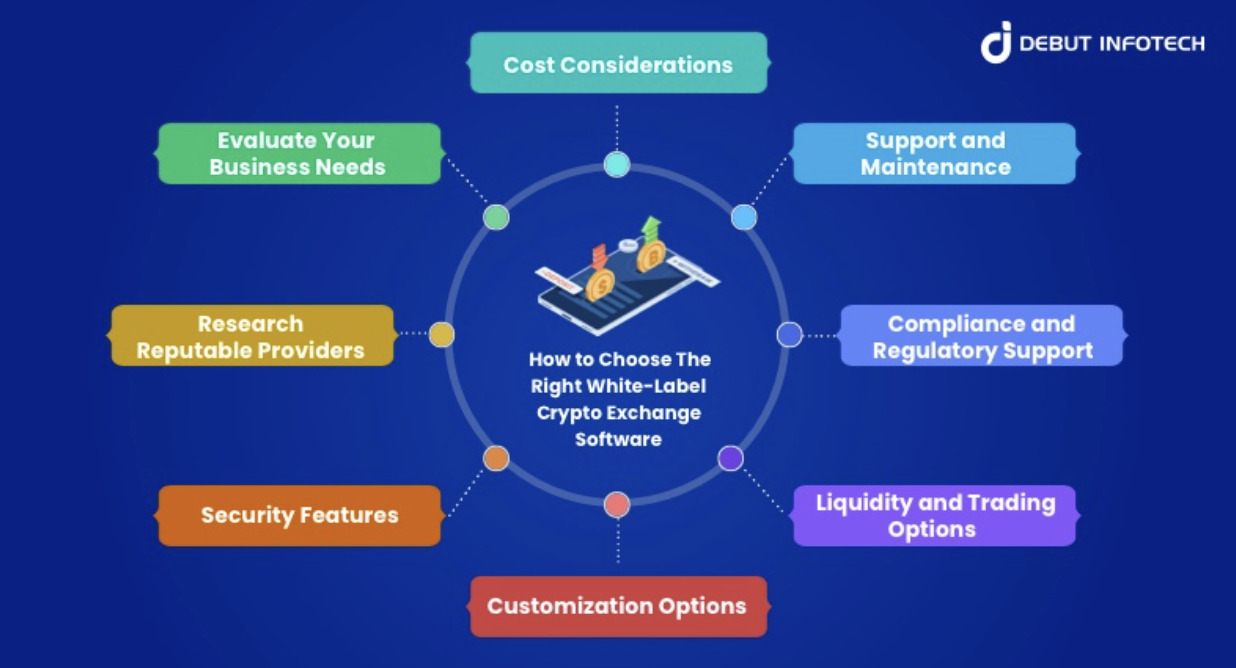
As the crypto market expands, businesses are increasingly seeking ways to enter the space efficiently and effectively. One solution that has gained substantial traction is the white label crypto exchange. This concept allows companies to launch their own cryptocurrency trading platforms without needing extensive development and infrastructure investment.
In this article, we will explore what a white label crypto exchange is, its benefits, and why it may be a strategic choice for those looking to establish a presence in the crypto trading market.
What is a White Label Crypto Exchange?
A white label cryptocurrency exchange is a ready-made, customizable cryptocurrency trading platform provided by a third-party service provider. The term “white label” refers to a service or product created by one company that other companies rebrand to make it appear as if they had made it. In the context of crypto exchanges, a white label solution includes all the essential features and functionalities required for trading digital assets, which businesses can then tailor to fit their brand and specific needs.
Concept of White Label Crypto Exchanges
SWhite label solutions offer a comprehensive framework that can be personalized to meet specific business requirements, allowing companies to focus on user experience and market strategies rather than technical development.
The Evolution of White Label Solutions in the Crypto Industry
White label software solutions have a rich history dating back to the 1990s, where they initially emerged as customizable templates offered by software developers for independent use. This concept gained traction across various sectors during the Web 2.0 era, empowering businesses with ready-made solutions to compete in the market.
In the realm of cryptocurrencies, the adoption of white label practices accelerated as the industry grew exponentially. By 2024, many new crypto exchange startups favor white label solutions due to their efficiency in avoiding complexities associated with in-house development, security implementation, and operational challenges.
White label exchange crypto receives fully functional platform templates, which they can customize extensively. This customization includes visual elements, functional features, and user interface enhancements tailored to enhance the trading experience. The simplicity of setup and accelerated time-to-market offered by white label solutions continue to position them as the preferred choice in the dynamic crypto exchange sector.
Key Components of a White Label Crypto Exchange
1. Trading Engine
The core component matches buy and sell orders, ensuring that trades are executed efficiently and accurately.
2. User Interface
A customizable front end that provides users with a seamless trading experience, including features like charts, order books, and transaction history.
3. Wallet Integration
Secure digital wallets for storing cryptocurrencies, ensuring the safety of users’ assets.
4. Admin Panel
A robust backend interface for administrators to manage users, monitor transactions, and configure platform settings.
5. Security Features
Advanced security measures, including encryption, two-factor authentication (2FA), and anti-money laundering (AML) compliance.
6. Liquidity Management
Access to liquidity pools to ensure users can trade without significant delays or price slippage.
Benefits of a White Label Crypto Exchange
1. Cost-Effective
Developing a cryptocurrency exchange platform from scratch demands substantial financial investment and time. A white label solution significantly reduces these costs. This makes it an attractive option for startups and established businesses.
2. Time-Saving
Time-to-market is critical in the fast-paced world of cryptocurrencies. White label exchanges enable companies to launch their platforms quickly, often within weeks, compared to the months or years required for custom development.
3. Customizable
Despite being a ready-made solution, white label exchanges offer extensive customization options. Businesses can tailor the platform’s look, feel, and functionality to align with their user needs and brand identity.
4. Proven Technology
White label exchange solutions are typically built on proven and tested technology. This reduces the risk of technical issues and ensures a stable and reliable trading environment.
5. Regulatory Compliance
Navigating the regulatory landscape of cryptocurrencies can be complex. White label providers often incorporate compliance features to help businesses follow local and international regulations.
Why Choose a White Label Crypto Exchange?
Choosing a white label crypto exchange is a strategic decision for several reasons:
Market Opportunity
The cryptocurrency market is burgeoning, with increasing demand for diverse trading platforms. A white label solution allows businesses to capitalize on this growing market quickly.
Focus on Core Competencies
By leveraging a white label solution, businesses can concentrate on their core competencies, such as marketing, customer acquisition, and service improvement, rather than getting bogged down by technical development.
Scalability
White label exchanges are designed to handle significant user growth and trading volume, allowing businesses to scale their operations without major overhauls.
Competitive Edge
Speed to market, combined with a robust, feature-rich platform, provides a competitive edge in attracting and retaining users in a extremely competitive landscape.
How to Choose The Right White Label Crypto Exchange Software

Choosing the right white label crypto exchange software is crucial for businesses aiming to enter the dynamic world of cryptocurrency trading. Here’s a comprehensive guide to help you navigate through the selection process and make an informed choice:
1. Evaluate Your Business Needs
Begin by assessing your specific requirements. Consider factors such as target market, desired cryptocurrencies to be supported, trading features (e.g., margin trading, futures), regulatory compliance needs, and scalability requirements.
2. Research Reputable Providers
Look for established and reputable white label solution providers in the cryptocurrency industry. Providers like AlphaPoint, B2Broker, and Binance Cloud are known for offering robust platforms with extensive customization options. Research their track record, client testimonials, and the features they offer.
3. Security Features
Security is paramount in cryptocurrency exchanges. Ensure the white label solution includes robust security measures such as two-factor authentication (2FA), encryption protocols, cold storage for funds, and regular security audits. Verify the provider’s adherence to industry best practices and regulatory standards.
4. Customization Options
The ability to customize the platform according to your branding and user experience requirements is essential. Evaluate the flexibility of the white label exchange software in terms of UI/UX customization, integration of additional features, and scalability to accommodate future enhancements.
5. Liquidity and Trading Options
Assess the liquidity solutions offered by the provider. Look for access to liquidity pools, partnerships with other exchanges, and the ability to handle high trading volumes without significant price slippage. Endavour the platform supports a wide range of trading pairs and advanced trading options if needed.
6. Compliance and Regulatory Support
Cryptocurrency regulations vary widely across jurisdictions. Choose a white label solution that offers robust compliance tools, including Know Your Customer (KYC) and Anti-Money Laundering (AML) procedures. Ensure the platform can adapt to evolving regulatory requirements to avoid legal issues.
7. Support and Maintenance
Consider the level of technical support and ongoing maintenance offered by the white label crypto development company. Reliable customer support is vital for resolving issues promptly and ensuring uninterrupted operation of the exchange. Evaluate the provider’s responsiveness and availability of support channels.
8. Cost Considerations
While cost shouldn’t be the only determining factor, consider the pricing structure of different white label solutions. Compare initial setup costs, transaction fees, and any additional charges for customization or support services. Ensure transparency regarding pricing to avoid unexpected expenses.
What is The Price for White Label Crypto Exchanges?
The cost of setting up a cryptocurrency white label exchange differs and depends on several factors, including the provider, customization requirements, features included, and ongoing maintenance.
Here’s a breakdown of the typical pricing considerations for white label crypto exchanges:
1. Initial Setup Costs
Providers may charge an initial setup fee, which covers the deployment and customization of the exchange platform. This fee varies based on the complexity of the customization and the features incorporated in the package.
2. Transaction Fees
Some white label providers charge transaction fees for trades executed on the platform. These fees can be fixed per transaction or based on trading volume and are a source of revenue for the exchange operator.
3. Customization Charges
Additional customization beyond the standard features of the white label cryptocurrency exchange software package may incur extra charges. This can consist of UI/UX design changes, integration of specific trading functionalities, or development of proprietary features.
4. Ongoing Maintenance and Support
Providers typically offer ongoing maintenance and support services, which may be included in a monthly or annual subscription fee. This ensures continuous operation, security updates, and technical support for the exchange platform.
5. Additional Services
Optional services such as marketing support, regulatory compliance consulting, and integration with third-party services may incur extra costs depending on the provider’s pricing structure.
Understanding White Label Crypto Exchange Development
White label crypto exchange development involves creating a customizable cryptocurrency trading platform using pre-built software provided by a third-party service provider. This exchange developing process allows businesses to brand the platform as their own and tailor its features to meet specific requirements without the extensive time and financial investment required for building an exchange from scratch.
Key Steps in White Label Crypto Exchange Development
1. Requirement Analysis
The process begins with thoroughly analyzing the business’s requirements. This includes identifying target markets, user demographics, preferred cryptocurrencies, and specific functionalities such as margin trading, futures, or staking. Understanding these needs will help you in selecting the right white label solution and customizing it effectively.
2. Selecting a White Label Provider
Choosing a reputable white label solution provider is crucial. Providers like AlphaPoint, B2Broker, and Binance Cloud offer comprehensive platforms with various customization options. The selection process should consider factors such as the provider’s track record, security features, compliance capabilities, and support services.
3. Customizing the Platform
Once a provider is chosen, the next step is customization. This involves tailoring the user interface (UI) to align with the business’s branding, including logos, color schemes, and layout preferences. Customization also extends to the platform’s features and functionalities, ensuring they meet the specific needs of the target audience.
4. Integrating Security Features
Security is paramount in crypto trading. White label solutions typically have built-in security features such as two-factor authentication (2FA), encryption, and anti-money laundering (AML) protocols. Businesses can further enhance security by integrating additional measures like biometric authentication and multi-signature wallets.
5. Setting Up Wallets and Payment Gateways
Secure digital wallets for storing users’ cryptocurrencies are critical to any exchange business. The development process includes setting up hot and cold wallets to ensure the safe storage and management of digital assets. Additionally, integrating reliable payment gateways for fiat transactions enhances the platform’s functionality.
6. Liquidity Management
Ensuring liquidity is essential for the smooth operation of a crypto exchange platform. White label providers often offer access to liquidity pools or partnerships with other exchanges to facilitate this. Effective liquidity management helps in maintaining tight spreads and reducing price slippage, providing a better trading experience for users.
7. Compliance and Regulatory Setup
Navigating the complex regulatory landscape of cryptocurrencies is vital for legal operation. White label solutions usually include compliance tools to adhere to local and international regulations. This step involves setting up Know Your Customer (KYC) processes and ensuring the platform meets the necessary legal requirements.
8. Testing and Quality Assurance
Before launching, the platform undergoes rigorous testing to identify and resolve any issues. This includes functional testing, security testing, performance testing, and user acceptance testing (UAT). Quality assurance ensures the platform operates smoothly and securely, providing a reliable trading environment.
9. Launch and Marketing
After successful testing, the platform is ready for launch. A well-planned marketing strategy is essential to attract users and establish a presence in the competitive crypto market. This can involve digital marketing, partnerships, and promotional campaigns to build brand awareness and drive user acquisition.
10. Ongoing Support and Maintenance
Post-launch, continuous support and maintenance are vital to address any technical issues, update security protocols, and introduce new features. White label providers typically offer ongoing support services to ensure the platform remains up-to-date and secure.
Future Prospects
As the crypto market grows, the demand for white label solutions will grow. Future developments may include more advanced features such as decentralized exchange (DEX) capabilities, enhanced security measures, and broader regulatory compliance tools. Moreover, integrating artificial intelligence (AI) and machine learning (ML) could further enhance the functionality and user experience of these platforms.
Conclusion
White label crypto exchanges represent a pivotal innovation in the cryptocurrency industry, providing a streamlined, cost-effective means for businesses to launch their own trading platforms.
By leveraging these solutions, companies can swiftly enter the market, customize their offerings, and focus on growing their user base. As the industry evolves, white label solutions will likely continue to play a crucial role in shaping the future of cryptocurrency trading.
Debut Infotech is a leading cryptocurrency exchange development company, offering robust solutions tailored to meet diverse business needs in the cryptocurrency market. With a proven track record of delivering safe and customizable platforms, they empower businesses to launch quickly and efficiently.
Their expertise in integrating advanced features, ensuring regulatory compliance, and providing exceptional support makes them a trusted partner in the industry.
For those seeking reliability, scalability, and innovation in their cryptocurrency ventures, Debutinfotech’s comprehensive white label solutions offer a solid foundation for success. Discover how they can elevate your crypto exchange ambitions today.
Disclaimer: This article contains sponsored marketing content. It is intended for promotional purposes and should not be considered as an endorsement or recommendation by our website. Readers are encouraged to conduct their own research and exercise their own judgment before making any decisions based on the information provided in this article.



































































